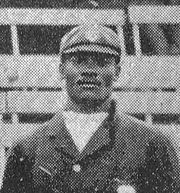
Archie Cumberbatch
Encyclopedia

Barbados
Barbados is an island country in the Lesser Antilles. It is in length and as much as in width, amounting to . It is situated in the western area of the North Atlantic and 100 kilometres east of the Windward Islands and the Caribbean Sea; therein, it is about east of the islands of Saint...
, death details unknown) was a West Indian cricketer who toured England in 1906. He was a right arm fast bowler.
Although raised in Barbados he found few opportunities there and moved to Trinidad in 1896 to serve as groundsman to Queen's Park Cricket Club in Port-of-Spain. In 1896-97 he played for Trinidad against both Lord Hawke's team
Lord Hawke's XI cricket team in West Indies in 1896-97
A team of Amateurs under the captaincy of Lord Hawke toured the West Indies in the 1896-97 season playing matches between January and April 1897. They played a total of 14 matches of which 7 are regarded as first class...
and Priestley's team
AA Priestley's XI cricket team in West Indies in 1896-97
A team of Amateurs under the captaincy of Mr. A. A. Priestley toured the West Indies in the 1896-97 season playing matches between January and March 1897. They played a total of 16 matches of which 9 are regarded as first class. They did not play in British Guiana....
, playing for the combined West Indies side and taking an incredible 45 wickets in the 5 matches. Even in Trinidad being a Professional limited his opportunities to play in important matches, the Inter-Colonial Tournament
Inter-Colonial Tournament
The Inter-Colonial Tournament was the main first class cricket competition in the West Indies before World War II.- Competing teams :* Barbados* British Guiana* Trinidad...
being restricted to Amateurs only.
He returned to Barbados briefly in 1899 before moving to Jamaica to play for the Lucas Cricket Club
Lucas Cricket Club
Lucas Cricket Club is a cricket club in Kingston, Jamaica. The club was founded in 1895 as the Jamaica Cricket Club by ex-students of Calabar Elementary School, organised by David Ellington, a hackney cab driver. Robert Slade Lucas, the captain of a team from England visiting Jamaica at the time,...
in Kingston
Kingston, Jamaica
Kingston is the capital and largest city of Jamaica, located on the southeastern coast of the island. It faces a natural harbour protected by the Palisadoes, a long sand spit which connects the town of Port Royal and the Norman Manley International Airport to the rest of the island...
. Returning again to Barbados in 1900 he played for Fenwicks Cricket Club and then moved back to Trinidad in 1901 to play for Stingo Cricket Club. Despite his impressive form he was not selected for the 1900 tour to England.
His next important matches were against Lord Brackley's team
Lord Brackley's XI cricket team in West Indies in 1904-05
Lord Brackley's XI was the fifth team of English cricketers to tour the West Indies, playing in the 1904-05 season. The team was captained by John Egerton, 4th Earl of Ellesmere and played a total of 20 matches between January and April 1905, of which ten are regarded as first class...
in 1904-05. In the first Trinidad matc he took 13 wickets and was then selected for the combined West Indies team. He took 4 wickets in this match and then a further 7 in the second Trinidad game to complete an impressive two weeks cricket.
He then played in all 4 matches for the Trinidad when they toured Jamaica in 1905-06. He was again impressive taking 31 wickets and then finishing off with 127* in the final match.
He was selected for the second West Indies
West Indian cricket team in England in 1906
The West Indian cricket team toured England in the 1906 season. The team played 19 matches between 11 June and 18 August 1906 of which 13 were regarded as first-class....
touring side that toured England in 1906
1906 English cricket season
The 1906 English cricket season saw the Championship decided on the very last day with Kent just pipping Yorkshire for the title. George Hirst achieved the unique feat of a "double Double", i.e...
. In 12 first class matches he scored 223 at an average of 11.73 and took 24 wickets at an average of 29.95. Before the 1906 tour he was described as a "one of the best professional bowlers in the West Indies (fast over-arm). Is a native of Barbados" and "a professional who may be looked on as the mainstay of the attack. He bowls fast right arm, with an off break, the balls rising very sharply with the pitch. He has a good defence and is a safe field". He turned out to be a disappointment on the tour, his wickets being very expensive. He did score a rapid 59* in 65 minutes against the M.C.C.
Marylebone Cricket Club
Marylebone Cricket Club is a cricket club in London founded in 1787. Its influence and longevity now witness it as a private members' club dedicated to the development of cricket. It owns, and is based at, Lord's Cricket Ground in St John's Wood, London NW8. MCC was formerly the governing body of...
but never took 5 wickets in an innings. In truth he was well passed his best by this time.
Back in the West Indies he played in William Shepherd's team in one of their matches Trinidad in 1909-10 but this was his only first class match after the 1906 tour.
Strangely during the 1906 tour he was invariably reported as being "C.P. Cumberbatch" whereas it appears that he was actually "A.B. Cumberbatch", C.P. Cumberbatch being a different player. It was only in 2000 that much of the confusion concerning these two men was resolved by Ray Goble and Keith Sandiford.

